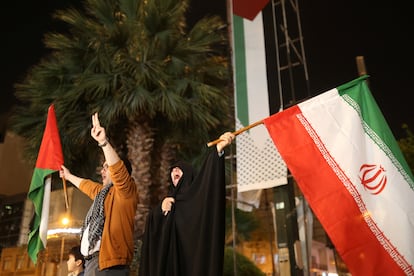Explosive scenario in the Middle East
Iran’s retaliation against Israel was the last red line left to cross to prevent an open war from breaking out in the region

Iran’s feared military retaliation against Israel began on Saturday with the launch of several dozen drones at 11 p.m. local time. The attack was announced by Israel and confirmed in a matter of minutes by the United States and Tehran itself, which spoke of “drones and missiles.” The Israeli army said that it would take “hours” for the weapons to reach its airspace. Explosions began to be heard over Israeli territory in the early hours of Sunday morning. According to Israel, 99% of the drones and missiles were intercepted.
The military action — the first direct attack by Iran on Israel in its territory despite decades of confrontation — represents the spillover of an explosive situation that the entire region and international community had been warning against. The situation perhaps reached a point of no return when Israel attacked the Iranian consulate in Damascus on April 1 and killed a high-ranking military commander. The next few hours are crucial to preventing a regional war in the Middle East with immediate global repercussions — that is, if it didn’t already start Saturday night.
Israel was on high alert throughout Saturday. During the afternoon, Tehran forces assaulted a ship linked to an Israeli businessman in the Strait of Hormuz. U.S. President Joe Biden said Friday that Iran was going to attack “sooner rather than later,” and again warned Iran against retaliating. Despite his evident impatience with the escalating violence, Biden has been very clear that his disagreements with Israeli Prime Minister Benjamin Netanyahu over Israel’s brutal military action in the Gaza Strip — which has killed more than 30,000 people and sparked a humanitarian crisis, with Gazans suffering from famine and daily hardships without modern precedent in the region — have not in any way affected U.S. resolve to back Israel in the face of an attack.
Tehran’s action is unprecedented and comes amid what could already be considered a pre-war scenario, in which countries such as Russia and France have asked their citizens not to travel to the region, a senior Pentagon commander has traveled to Israel and several airlines have canceled flights to the area.
This is the scenario six months after the savage attack by Palestinian Hamas terrorists, sponsored by Iran, in Israeli territory on October 7. Since then, everything that could get worse has got worse. The Israeli response to the attack quickly became disproportionate, causing a horror unknown even to the Gaza Strip and triggering the breakdown of solidarity with Israel. Since nearly the start of the war in Gaza, warnings about the possibility of open confrontation in the region have been part of the conversation. With the bombing of the Iranian consulate in Damascus, Israel technically attacked Iranian territory. But with Iran’s aerial military action on Saturday night, the last remaining red line to prevent the Gaza war from turning into an open regional conflict was crossed.
The actors with the most standing on the international stage, especially those who have a direct line with both governments, face the challenge of finding a way to stop a total war from breaking out, despite the fact that, as of last night, all the elements that one or the other established as necessary for that to happen are now on the table.
Sign up for our weekly newsletter to get more English-language news coverage from EL PAÍS USA Edition
Tu suscripción se está usando en otro dispositivo
¿Quieres añadir otro usuario a tu suscripción?
Si continúas leyendo en este dispositivo, no se podrá leer en el otro.
FlechaTu suscripción se está usando en otro dispositivo y solo puedes acceder a EL PAÍS desde un dispositivo a la vez.
Si quieres compartir tu cuenta, cambia tu suscripción a la modalidad Premium, así podrás añadir otro usuario. Cada uno accederá con su propia cuenta de email, lo que os permitirá personalizar vuestra experiencia en EL PAÍS.
¿Tienes una suscripción de empresa? Accede aquí para contratar más cuentas.
En el caso de no saber quién está usando tu cuenta, te recomendamos cambiar tu contraseña aquí.
Si decides continuar compartiendo tu cuenta, este mensaje se mostrará en tu dispositivo y en el de la otra persona que está usando tu cuenta de forma indefinida, afectando a tu experiencia de lectura. Puedes consultar aquí los términos y condiciones de la suscripción digital.









































